#we see everything through some kind of lens
Text
Philosophy idea?
Why are certain things considered inherently “good” (such as kindness, compassion, etc.). Is “good” even a realistic concept, or do we just have a collective consciousness that thinks “good” is the same thing. Maybe we are hardwired to think a certain way, but how does that mean that that way is THE way. The concept of “good” is not even possible, because that would mean there is an absolute, objective truth, that was universally agreed upon, and that does not seem possible unless there is some higher level creating an objective truth, but god isn’t real so either there’s some higher level that decides the absolute truth or “good” does not exist.
#text post#philosophy#that concept of a higher level that we cannot know is kinda like kantian humility i think because we cannot know a think “in itself” aka wi#without relation to anything#and this is similarly not being able to know something objective#because at the end of the day that's really what kant was talking about when he said “in themselves” he meant “completely objectively” and#e cannot ever see anything completely objectively#we see everything through some kind of lens#and “good” is only one part of this lens because with the concept of “good” we are all working on the assumption that we are able to see ob#ectively but we cannot all have one objective truth unless there is some kind of higher level than humans#there is no good or there is a god?#idk#shower thoughts#im not in the shower#high asf
0 notes
Text


#he's so insane omg.#just like the.#the way that HE is a little freak who beats around the bush#the implication that nisei is like. direct and polite with him is also really funny.#because like yeah but also lol. because like that's implied to be masking but mei at some point points out that masking is to a degree--#the real you like WE KNOW NISEI CAN BE SO CUTES AND NICEYS ITS JUST LIKE OMG. SCREAMS THEYRE CRAZY sighs#nisei is also the kind of person who is just like masking and hiding and pushing away everything and i think like a lot of the stuff he--#feels gets filtered through the lens of anger like omg.#when mei complains about nisei not liking her it's so sweet like she hates him but wants him to like her bc she's so cutes and stuff and--#like we never see him being directly rude to her to her face which is like. sweet FOR NISEI. in his own way.#she like doesn't understand that he's like crazy and hates everyone because he's crazy but also moreoever it seems like he especially--#dislikes like.#children but in really specific ways like he hates incompetent children because he's projecting and he hates competent children because--#he's jealous and also self loathing as always lmfao like HE'S SO FUNNY IDK idk.#he's so crazy omg they're all so crazy. i love nisei he's so great. omg.#*hits him with my car and giggles*#mine
1 note
·
View note
Note
do you think Falin's chimerism would affect her lifespan and behaviors? or just her body? maybe she can make more animalistic noises or has vague dragon-like instincts?
that’s a really good question! I think we could probably figure this out by taking a look at what we know about Falin, what we know about red dragons, whether these things would apply to Falin, and go from there.
The obvious external changes Falin has are: her eyes, her teeth, and her feathers.
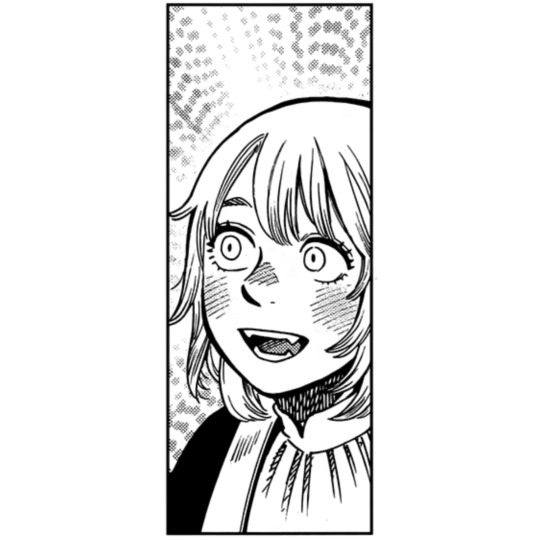
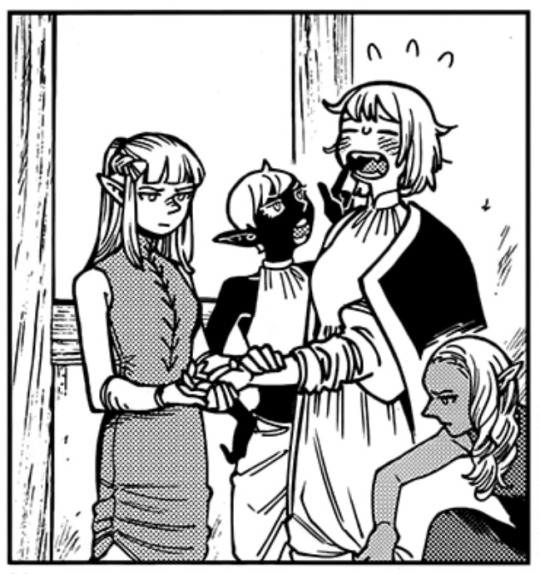
It’s hard to pin down what Falin is like! Throughout the duration of the manga, she wasn’t really a character so much as a plot device. We have almost nothing told from her point of view, and the majority of her unbiased (as in, we’re seeing her through a neutral lens and not another character’s perception of her) characterization is from the post-canon omake.
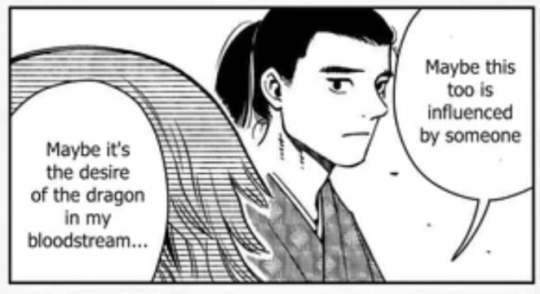
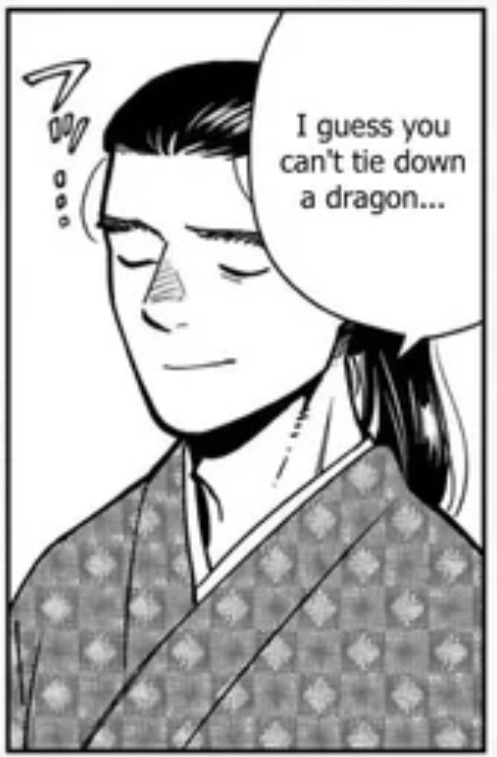
Even Falin believes that her wanderlust might come from her dragon side, but she's not sure. Personally, I think it’d make a lot of sense if it kind of does, in the sense that she has 20/20 vision now, haha! For most of her life, she could probably only see clearly within a relatively small sphere surrounding her, and now she can see everything. She can look up and around freely in a way she couldn’t before. Fuck man, if I had magic lasik I’d probably go out more too.
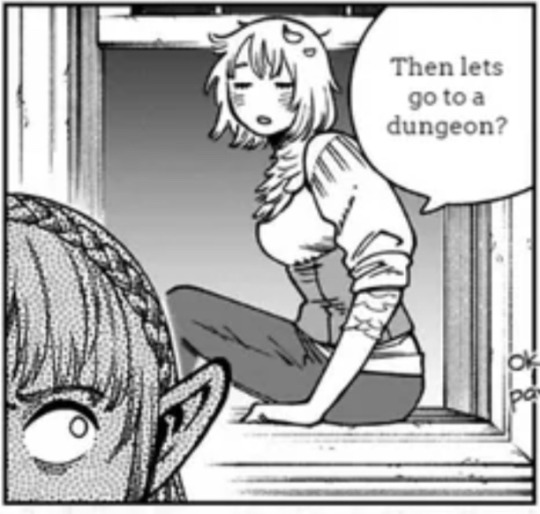
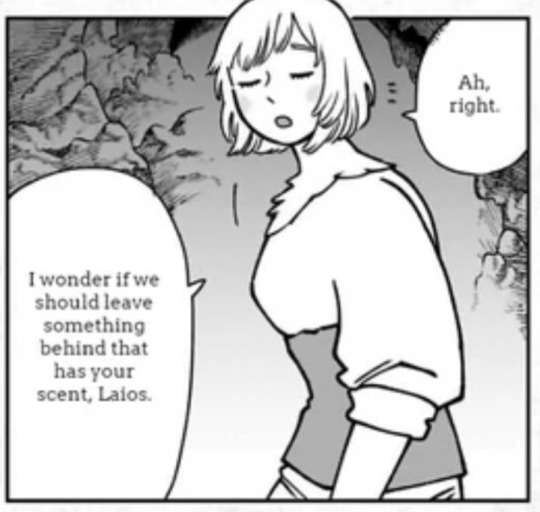
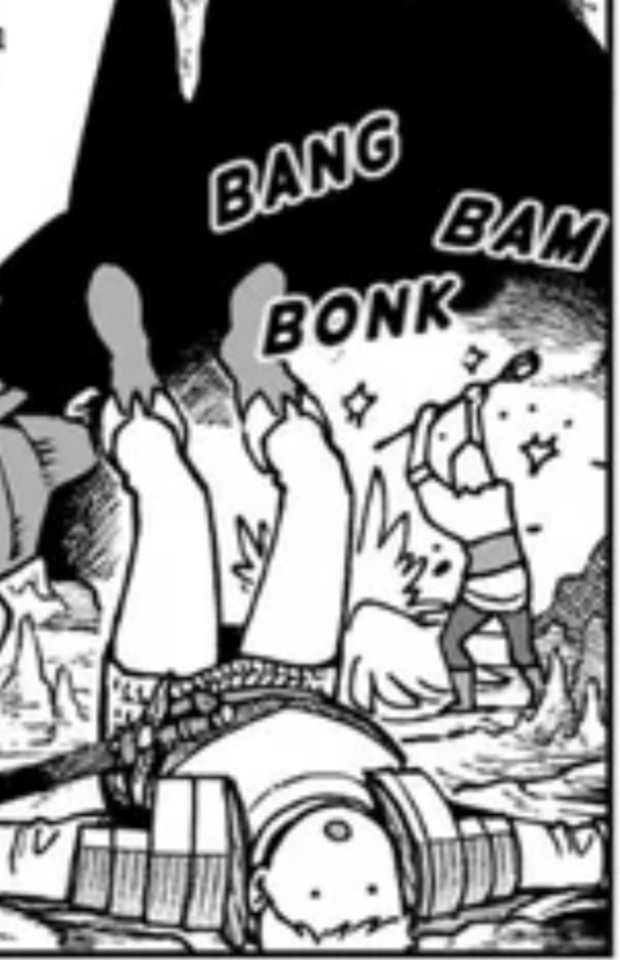
Some other quirks that are really unclear whether it’s typical for Falin or chimera-influenced:
she enters rooms through windows, sometimes. And given the leaves in her hair, I think it’s reasonable to assume this is not the first floor 💀 But who knows! Maybe that’s not new for Falin.
She points out that Laios’s scent could deter monsters. Maybe she has enhanced smell. But again, it isn’t unreasonable to think this is something she would have said before. (I think even Chilchuck and Izutsumi, whose senses of smell are enhanced, can’t identify scents well. Kuro, however, can.)
VIOLENCE! But again, we’ve seen her beat shit with her staff before, and she also used to wield a flail. It IS a trait for red dragons to fight any large threat, so if anything, she’s got even better monster fighting instincts than before. I don't think this would carry over to people. Falin has always been better with people, and I'm personally not a fan of seeing her depicted as territorial or possessive. Marcille is already the possessive one, and didn't need dragon blood to be like that.
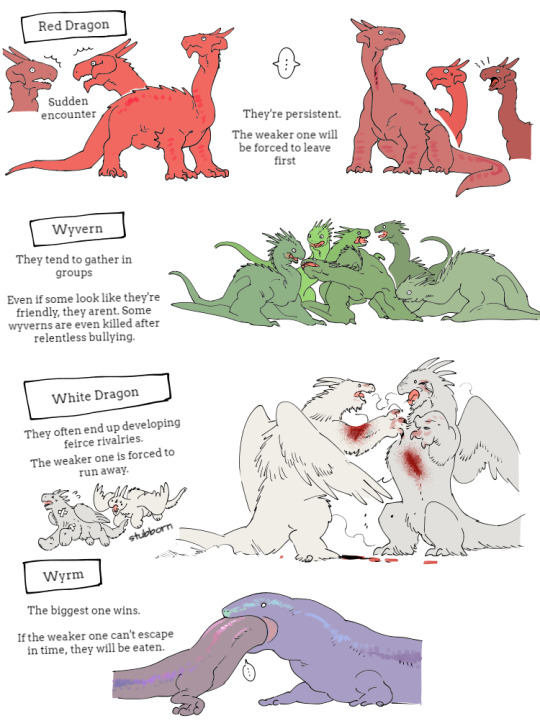
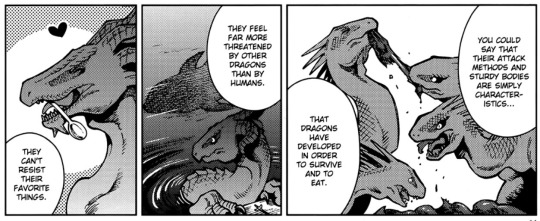
Ultimately, I don't think her dragon traits extend much farther beyond this. Especially when you consider How Little the dragon is represented as in her conscience.
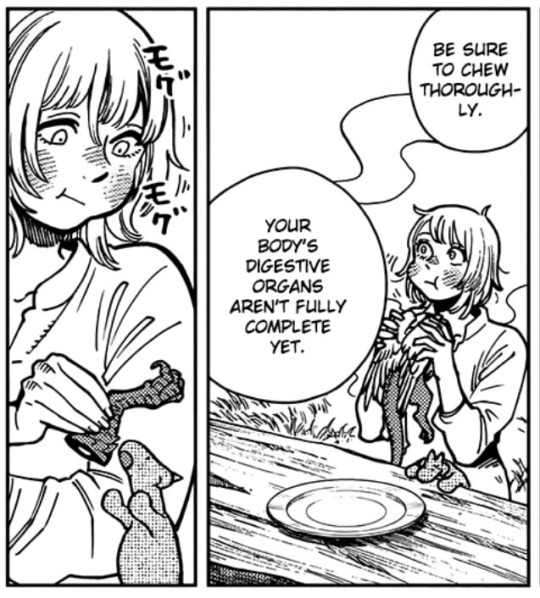
it's not like it's a 50/50 split. She's like a person with a dragon ratatouille. I don't think she'd be able to make dragon noises. I don't think her body is built for that. I know there's like, a set list of tropey characteristics that are given to almost every non-human character in fiction. and sure that's FINE but they tend not to be especially personalized to the character, and tend to just be an excuse to write them OOC. Like, sure, dragons may have instincts regarding sleep habits, hunting, courting, raising young, etc etc, but so do humans! And we don't compulsively act on every instinctual whim we have. I don't see why it'd be any harder for her new dragon instincts.
If anything, I think she'd feel more affected by the fact that she has part of the demon in her.
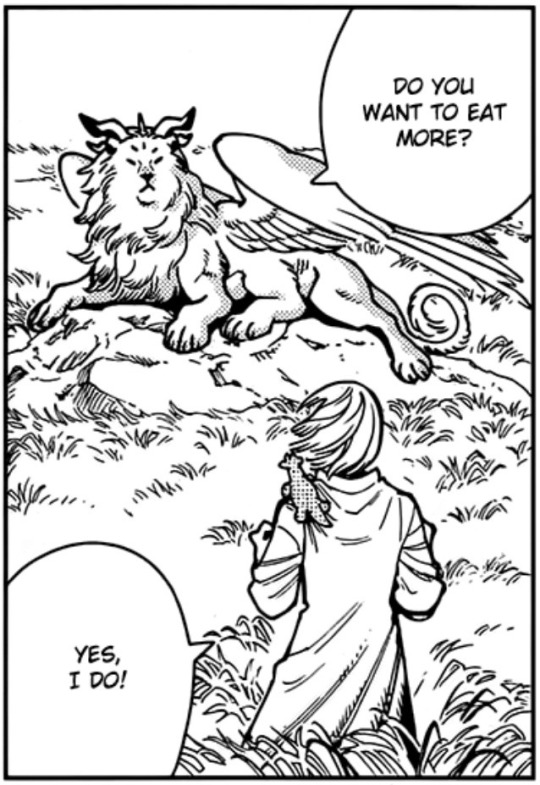
I don't think Falin's in any sort of trouble. All the demon was was a way to communicate with people. Here, it's representing Falin's tether to the infinite realm, to mana itself. The winged lion no longer has the desire to consume anymore because, yknow, Laios has that now. This is very likely why she no longer needs to chant to cast magic.
But what else does this mean for her? She already had unusually high reserves of mana + an innate connection with spirits, but is her mana essentially limitless now? How would that affect her lifespan? I'm leaning towards, it wouldn't really?? But is she immune to mana sickness now? Is it more like her magic is just sort of amplified like it would be in a dungeon?
We can infer that having more mana doesn't increase your lifespan, because-- while elves and gnomes have both naturally high levels of mana and longer lifespans-- dwarves live longer but have lowest levels of mana of all.
So to answer your question! Maybe a little bit?? But I don't think she'd change a whole lot.
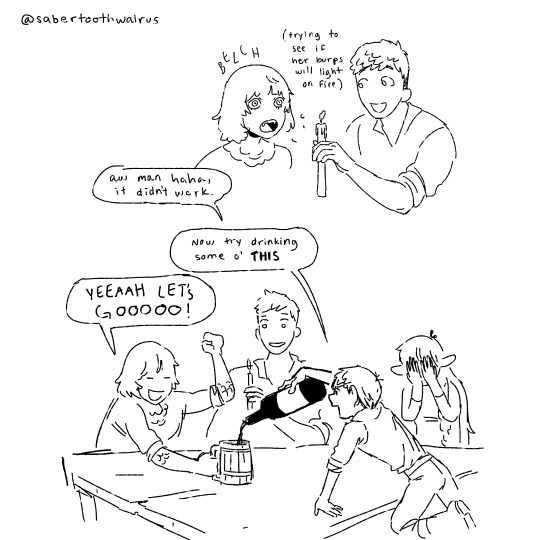
#dungeon meshi#dungeon meshi spoilers#long post#falin touden#laios touden#chilchuck tims#marcille donato#my art#comic
5K notes
·
View notes
Text
I was thinking about how the Padawans being part of the war effort DOES suck and kind of bother me, but for some reason I don't really see it as an in universe moral failing of the Jedi.
First I was like: well Star Wars is aimed at kids . A pov character that is a kid makes sense. Especially in the early seasons of TCW and Rebels. This was added in the cartoon and it became part of movie canon after the fact that Padawans held military rank. Suspension of disbelief etc etc.
Then I was like... Wait. Padme was fourteen when she became elected queen, and although it was supposed to be a peaceful rule it got to the point where other fourteen-year-olds became her body doubles in case of assassinations. She also goes and leads an army to take back her planet. At no point was anyone like: you know what you're fourteen you should probably stay at base camp while we do this. We don't actually need you for the storming the palace part.
The GFFA in universe does not place moral significance on it. It isn't weird. If it did there is no way Shmi would have said: yes my nine year old son will do the death race when he doesn't have to even though he has never won or finished before. The plot must allow the gffa to be okay with child endangerment with the good guys still being good guys. No one says Shmi is a terrible mom when she agrees to let Anakin do it. She wasn't being coerced she's just convinced that the only way to help people is to put a nine year old in a death race. In real life if she did that we'd be horrified. And remember Padme isn't bothered because of Anakin's age she's bothered that they're staking everything on a random kid.
So Padawan Commanders makes sense in the GFFA.
Although yeah it makes sense to feel bad about Padawan Commanders in the real world, it also doesn't really say anything about the Jedi and their morality. They're pretty in step with the rules of morality of the universe.
The GFFA has similarities, but it isn't our galaxy.
Would I want children in real life to be trained as Jedi? No. I wouldn't want an eight year old to be trained as crimefighting hero Robin either. It's only when we're looking back at these things through an adult lens and ground fantasy in reality that it becomes a problem.
If you don't want to suspend your disbelief that's fine. But can you make moral judgements on the Jedi without looking at anyone else in the galaxy about this one particular fact? I don't think you can.
I don't know, funny to think about. Especially with the newer media which is aimed at for adults with nostalgia. Then the story does try to seem grounded in reality, but also trying to justify the past where our belief was suspended.
516 notes
·
View notes
Text
thinking about how some decisions in the show don’t even make sense if you don’t have the context that Merlin and Arthur are deeply in love with each other.
the one that really fucking gets me is when Mordreds life is at stake and Arthur asks Merlin if he would rather have mordred die or accept magic back into Camelot. This is an opinion he values more than any other, an opinion that would change his mind and sway him.
Merlin, described as magic itself, has been tasked the entire. fucking. show. with returning magic to Camelot and pushing Albion into the golden age under Arthur’s rule. This is everything he’s been working towards this entire time- literally. his life, his years and years of protecting Arthur, all (IN THEORY) are because this golden age is what he wanted, and Arthur would have fully listened to him and likely chosen what Merlin chose. Everything he worked for was RIGHT THERE in front of him. It makes absolutely no sense for him not to pick it. But we all know what he picked. So why?
He didn’t do it for Camelot. He didn’t do it for any kind of golden age, or to fulfill the ultimatum of the prophecy in the revival of magic. No. He chose to deny magic and kill mordred solely because he could not bear to watch his love die and was so distraught that it clouded him. Merlin was so afraid of losing Arthur, his friend, his other half, his king, that he denied every goddamn thing he was working for all at the prospect of allowing Arthur to live past the prophecy and not die by mordred’s hand. You can see it through the show- the way Merlin falls deeper for Arthur, the way, to him, the prophecy becomes less about the promised golden age and more about how desperately he wants Arthur to live.
The tragedy of Merlin legitimately only happens because Merlin loved too strongly and protected his king too fiercely. His overflowing love was his bane, and it led to Arthur’s death. People who watch the show and don’t view it under that lens are missing so much.
…Merlin is literally a show about condemning your soulmate’s life because you loved them so deeply and recklessly, like what the actual fuck
393 notes
·
View notes
Text
Dinner with Aunt Denise & Uncle Jeff
A Tale of Science Fair Photography
Ever since my parents died my aunt and uncle have done their best to fill some of the hole left in my heart. It almost feels like they adopted me in a way. They check on me. They help me clean. They helped me sort through all of my parents' belongings. And from time to time they invite me over for dinner when I'm feeling up to it.
Last week I got a new invitation. I had been feeling pretty lonely as of late so I graciously accepted. Before I left I saw my camera sitting on the table and realized I had this fancy new lens which is especially suited for taking pictures of people.
I thought to myself...
"This lens has only taken pictures of bridges at sunset."


Which is cool and everything, but I don't really want my only photos to be of bridges at sunset. I like taking pictures of other things.
I didn't have any lighting equipment handy—just a single external flash. And without a solid plan for how I was going to use it, I quickly packed said flash and headed westward. As I saw the sun lowering in the sky above the highway my big photography brain had an idea...
"I should take pictures of *people* at sunset."
I needed a reflector of some kind to bounce my flash against. I thought poster board would probably suffice so I stopped at Walmart and headed to the arts and crafts area. I found these tri-fold poster board thingies that grade school kids use to display their science fair experiments.

I got 2 for $7!
What a deal!
After I arrived I asked if my aunt & uncle minded having their photo taken. My aunt said she was fine with it but warned me that no one had ever been able to take a decent photo of her.
I'm typically not one to be braggadocious, but I replied...
"Well, that's because you've never had your photo taken by ME."
I'm not sure I should have been so cocky considering my lighting equipment is typically used to display the life cycle of earthworms, baking soda volcanos, and... potato batteries—which was the delightful and totally real project I just found on Google.
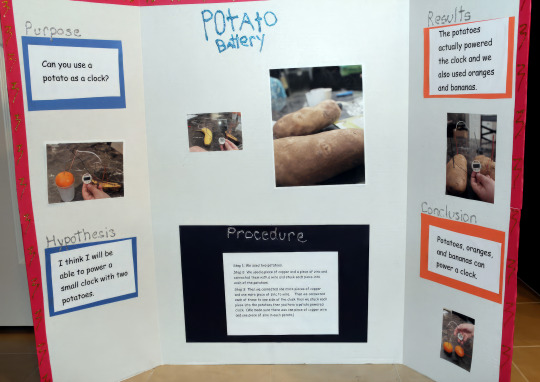
Science Fair Entry from Billy, Age 10
After a delicious feast of bratwurst, salad, and non-electrified potatoes, I convinced my aunt and uncle to sit for a sunset photoshoot. They even helped me set up my science fair project.
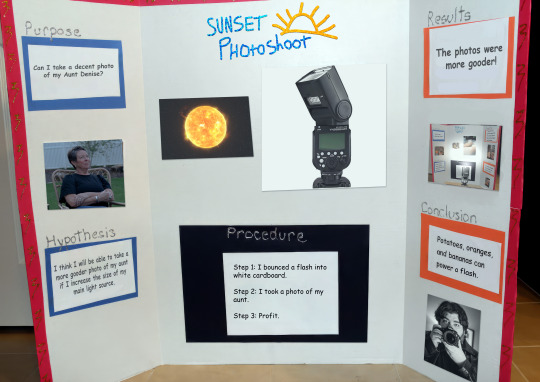
Science Fair Entry from Froggie, Age 42
I decided to do a quick test indoors to make sure my plan would work. Jeff volunteered for my first experiment.
Without my contraption...
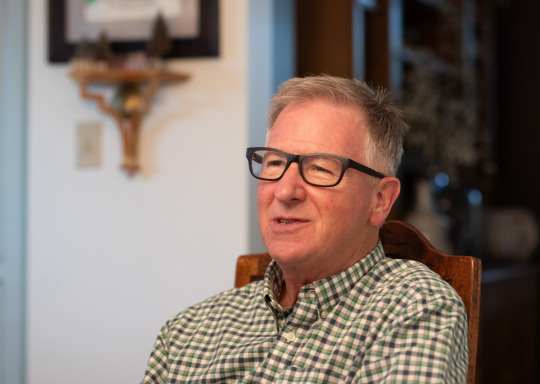
With my contraption...
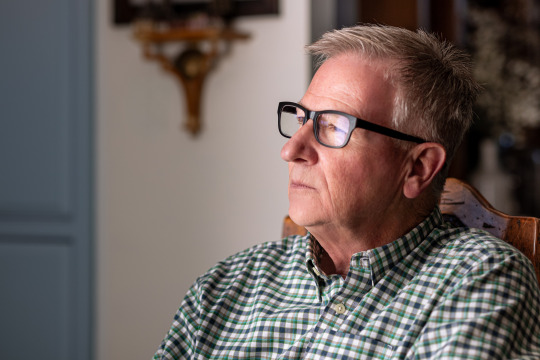

I think my experiment was quite promising. But would my idea hold up outside during the sunset with constantly dimming conditions?
We moved everything to the backyard. The tri-fold poster board was a bit ornery regarding its uprightness and needed to be tamed. My Uncle Jeff used a large rock, some pillows, and a step ladder to keep the makeshift reflectors in place.
I started taking test photos without the flash to figure out the background exposure.
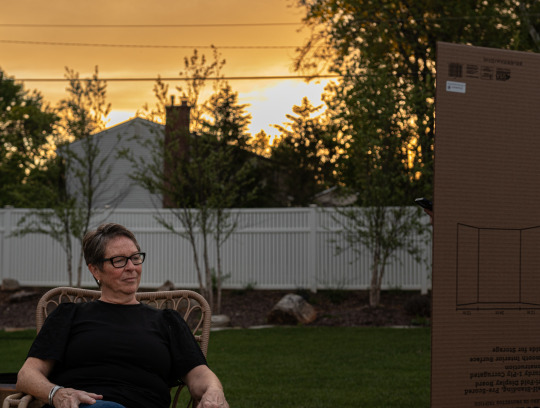
Those pesky power lines were going to need to be zapped later in Photoshop, but I was really digging the scenery.
I dialed everything in, started taking photos, and even on the little rear camera screen I felt like they were turning out well. With the sun setting the sky looked like it was on fire. But then the batteries died in my flash and I was starting to lose that fiery sky as darkness began to creep into view.
Unfortunately, all of the potatoes were in our bellies so my aunt scrambled to find regular batteries in the house.
This photoshoot had become a complete team effort with everyone doing their part to make it a success.
Surprisingly it was my Uncle Jeff was giving me some bona fide model poses. He just naturally has some sort of... resting model face. Very masculine and authentic. And my Aunt Denise is just pure sunshine manifested as a person. So I had no problems getting nice expressions from her.
So... would you like to see the pictures?
Will I get a blue ribbon on my science fair project?
Am I building up the suspense too much?
Okay, here we go...
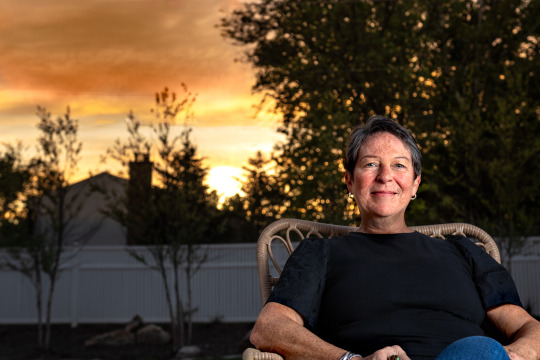
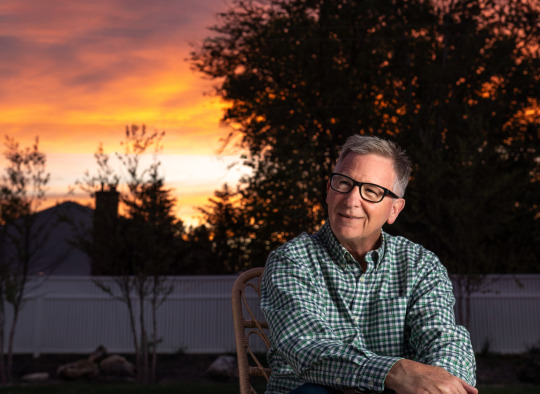
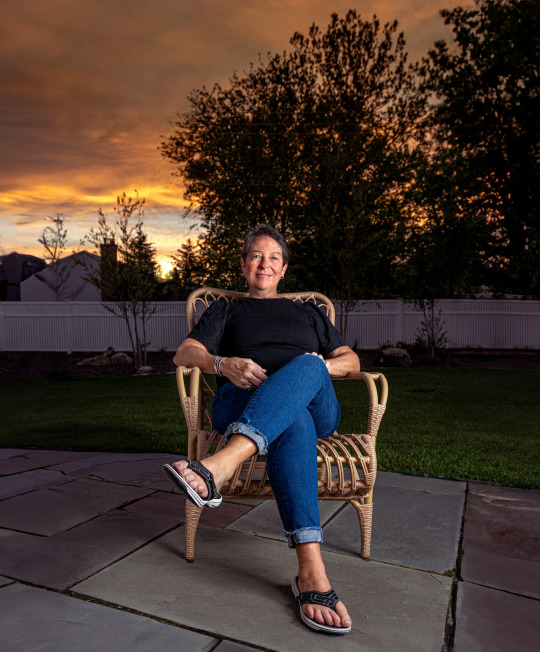
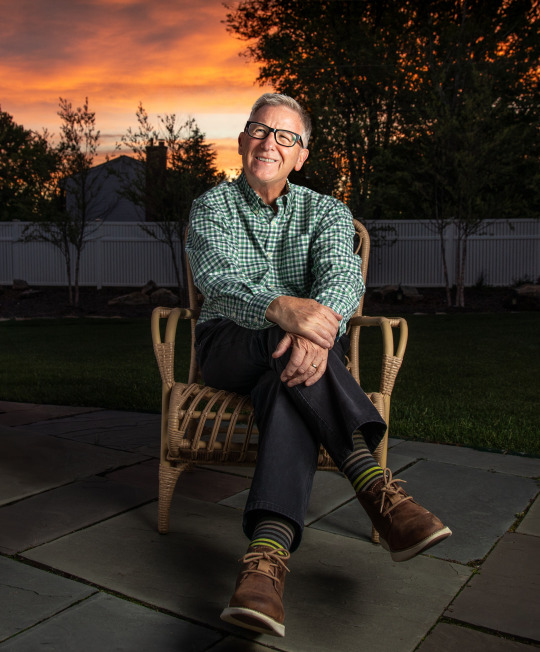
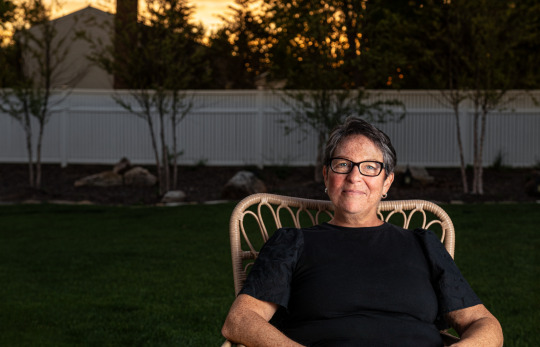
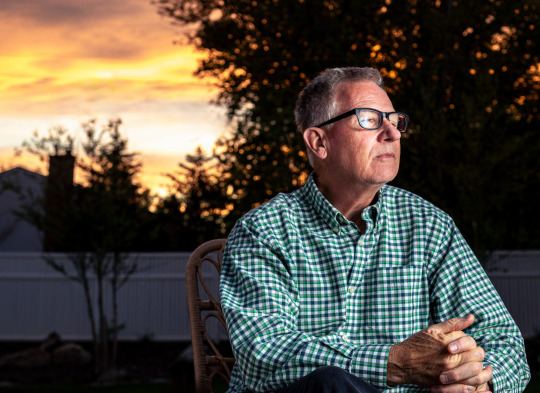
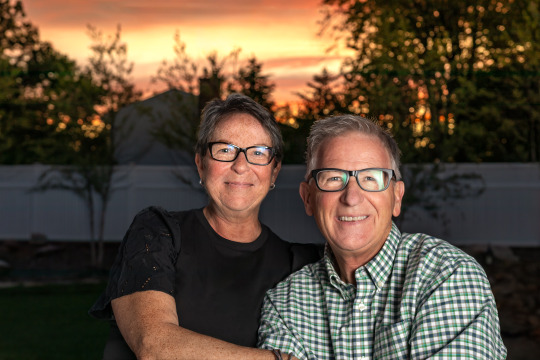
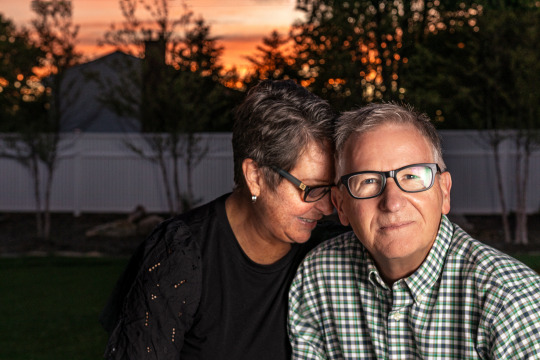
I suppose the only validation I really need is from the person who has never had a decent photo taken of them.
Let's see the verdict.
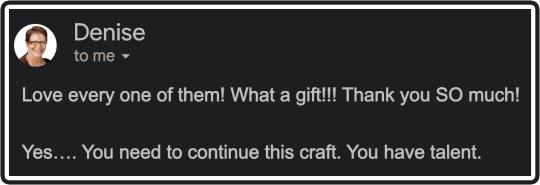
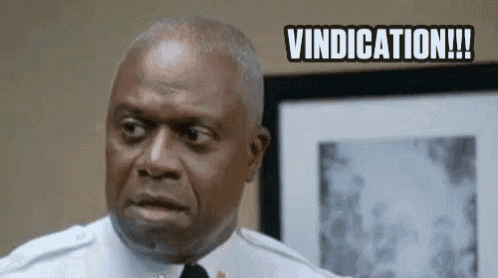
All of those hours and hours of photography training helped me learn the problem solving skills I needed to pull off a photoshoot with seven dollars in supplies.
Take a small light source, bounce it off something larger, and you get a big light source.
And big light sources make people look snazzy in photographs.
Easy!
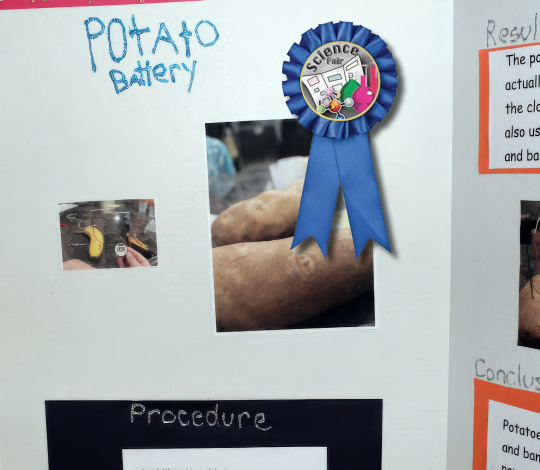
Are you kidding me?
I lost to the potato kid?
What kind of rigged nonsense...
416 notes
·
View notes
Text
From AnaMaria Abramovic on Fb
Paste magazine has done an article about Michael and how underrated he is in Good Omens and I found a transcript since it's behind a paywall. Here's the link if anyone wants to subscribe. 💙
https://www.pastemagazine.com/tv/amazon-prime-video/good-omens-michael-sheen-underrated-performance-explained-streaming
There’s so much to love about Prime Video’s Good Omens. A delightful adaptation of the popular Neil Gaiman and Terry Pratchett novel of the same name, the series is romantic, thoughtful, hilarious, and heartfelt by turns. The story of the almost-apocalypse and what comes afterward, it wrestles with big concepts like destiny, free will, and forgiveness, all framed through the lens of an unorthodox relationship between an angel and a demon whose love for one another is a key to saving the world.
As anyone who has watched Good Omens already knows, nothing about this series works without the pair of lead performances at its center. Stars David Tennant and Michael Sheen—who play the demon Crowley and the angel Aziraphale, respectively—have the kind of lighting-in-a-bottle chemistry that’s the stuff of legend, and their characters’ every interaction conveys both their deep affection for one another and the Earth they’ve made their home. Their romance is the emotional linchpin around which most of the series turns, and their heartbreaking separation in the Season 2 finale is so devastating precisely because we’ve seen how necessary the two are to each other’s lives.
But it’s Sheen’s performance in that final scene that really twists the knife. As Aziraphale’s face crumples following his and Crowley’s long-awaited kiss, the actor manages to convey what feels like every possible human emotion in the span of less than thirty seconds as the angel realizes what he has both had and just lost. The moment is emotionally brutal to watch, particularly after sitting through five and a half episodes of Aziraphale looking as lovestruck as the lead in any rom-com. Sheen makes it all look effortless, shifting from giddy joy to devastated longing and everything in between, and we really don’t talk enough about how powerful and underrated his work in this series truly is.
Though he’s half of the central duo that makes Good Omens tick, Sheen’s role often tends to get overshadowed by his co-star’s. It’s not difficult to see why, given that Tennant gets to spend most of the show swanning around in tight trousers looking like the Platonic ideal of the charming bad boy, complete with flaming red hair and dramatic eyewear. Tennant also benefits from Crowley’s much more sympathetic emotional arc. I mean, it’s hard not to love a cynical demon with a heart of gold who’s been pining after his angelic best friend for literal millennia even after being cast out from Heaven. Of course, viewers are drawn to that—likely a lot more easily than the story of an angel who’s simply trying the best he can to do the right thing as he wrestles with his role in God’s Ineffable Plan. Plus, let’s be real, Tennant’s sizeable Doctor Who fanbase certainly doesn’t hurt his character’s popularity.
As a performer, Sheen has a long history of playing both real people (Tony Blair, David Frost, Brian Clough) and offbeat villains (Prodigal Son’s Martin Whitly, Underworld’s Lucian, the Twilight Saga’s Aro). In some ways, the role of a fussy, bookish angel is playing more than a bit against type for him—Gaiman himself has said he originally intended for Sheen to be Crowley—but in his capable hands, Aziraphale becomes something much more than a simple avatar for the forces of Good (or even of God, for that matter). With a soft demeanor and a positively blinding smile, Sheen’s take on the character consistently radiates warmth and goodness, even as it contains surprisingly hidden depths. The former guardian of the Eastern Gate of Eden who gifted a fleeing Adam and Eve his flaming sword and befriended the Serpent who caused their Fall, Azirphale isn’t a particularly conventional angel. He enjoys all-too-human indulgences like food and wine, runs a Hoarders-esque bookshop that never seems to sell anything, and spends most of his time making heart eyes at the being that’s meant to be his hereditary adversary.
Given the much more difficult task of playing the literal angel to Tennant’s charming devil, Sheen must find a way to make ideas like goodness and forgiveness as interesting and fun to watch as their darker counterparts. It’s a generally thankless task, but one that Sheen tackles with gusto, particularly in the series’ second season, as Good Omens explores Aziraphale’s slowly evolving idea of what he can and cannot accept in terms of being a soldier of Heaven. His growing understanding that the truth of creation is colored in shades of grey and compromise is often conveyed through little more than Sheen’s deftly shifting expressions and body language.
Our pop culture consistently struggles to portray the idea of goodness as something compelling or worth watching. Explicitly “good” characters, particularly those who are religiously coded, are frequently treated as the butt of some sort of unspoken joke they aren’t in on, used to underline the idea that faith is a form of naivety or that kindness is somehow a weakness. For a lot of people, the entire concept of turning the other cheek is a sucker’s bet, and believing in something greater than oneself, be it a higher power or a sense of purpose, is a waste of time. But Good Omens is a story grounded in the idea that faith, hope, and love—for one another, God, and the entire world—are active verbs. And nowhere is that more apparent than in Sheen’s characterization of the soft angel whose old-fashioned waistcoats mask a spine of steel and who refuses to give up—on Crowley, on humanity, or on the idea that Heaven is still something that can be saved.
Though he and Tennant have pretty much become a matched set at this point (both on and off-screen), Sheen’s performance has rarely gotten the critical accolades it deserves. (Tennant alone was nominated for a BAFTA for Season 2, and Sheen was categorized as a supporting actor when the series’ competed in the 2019 Saturn Awards.) But it is his quiet strength that holds up so much of the rest of the show around him, and Sheen deserves to be more frequently recognized for it. That he makes it look so easy is just another sign of how good his performance really is.
268 notes
·
View notes
Text
Lovely new article about Michael in Paste magazine. Article is behind a paywall, so here is a transcription (with thanks to the person on FB who transcribed it, and the parts in bold are my own emphasis).
There’s so much to love about Prime Video’s Good Omens. A delightful adaptation of the popular Neil Gaiman and Terry Pratchett novel of the same name, the series is romantic, thoughtful, hilarious, and heartfelt by turns. The story of the almost-apocalypse and what comes afterward, it wrestles with big concepts like destiny, free will, and forgiveness, all framed through the lens of an unorthodox relationship between an angel and a demon whose love for one another is a key to saving the world.
As anyone who has watched Good Omens already knows, nothing about this series works without the pair of lead performances at its center. Stars David Tennant and Michael Sheen—who play the demon Crowley and the angel Aziraphale, respectively—have the kind of lighting-in-a-bottle chemistry that’s the stuff of legend, and their characters’ every interaction conveys both their deep affection for one another and the Earth they’ve made their home. Their romance is the emotional linchpin around which most of the series turns, and their heartbreaking separation in the Season 2 finale is so devastating precisely because we’ve seen how necessary the two are to each other’s lives.
But it’s Sheen’s performance in that final scene that really twists the knife. As Aziraphale’s face crumples following his and Crowley’s long-awaited kiss, the actor manages to convey what feels like every possible human emotion in the span of less than thirty seconds as the angel realizes what he has both had and just lost. The moment is emotionally brutal to watch, particularly after sitting through five and a half episodes of Aziraphale looking as lovestruck as the lead in any rom-com. Sheen makes it all look effortless, shifting from giddy joy to devastated longing and everything in between, and we really don’t talk enough about how powerful and underrated his work in this series truly is.
Though he’s half of the central duo that makes Good Omens tick, Sheen’s role often tends to get overshadowed by his co-star’s. It’s not difficult to see why, given that Tennant gets to spend most of the show swanning around in tight trousers looking like the Platonic ideal of the charming bad boy, complete with flaming red hair and dramatic eyewear. Tennant also benefits from Crowley’s much more sympathetic emotional arc. I mean, it’s hard not to love a cynical demon with a heart of gold who’s been pining after his angelic best friend for literal millennia even after being cast out from Heaven. Of course, viewers are drawn to that—likely a lot more easily than the story of an angel who’s simply trying the best he can to do the right thing as he wrestles with his role in God’s Ineffable Plan. Plus, let’s be real, Tennant’s sizeable Doctor Who fanbase certainly doesn’t hurt his character’s popularity.
As a performer, Sheen has a long history of playing both real people (Tony Blair, David Frost, Brian Clough) and offbeat villains (Prodigal Son’s Martin Whitly, Underworld’s Lucian, the Twilight Saga’s Aro). In some ways, the role of a fussy, bookish angel is playing more than a bit against type for him—Gaiman himself has said he originally intended for Sheen to be Crowley—but in his capable hands, Aziraphale becomes something much more than a simple avatar for the forces of Good (or even of God, for that matter). With a soft demeanor and a positively blinding smile, Sheen’s take on the character consistently radiates warmth and goodness, even as it contains surprisingly hidden depths. The former guardian of the Eastern Gate of Eden who gifted a fleeing Adam and Eve his flaming sword and befriended the Serpent who caused their Fall, Azirphale isn’t a particularly conventional angel. He enjoys all-too-human indulgences like food and wine, runs a Hoarders-esque bookshop that never seems to sell anything, and spends most of his time making heart eyes at the being that’s meant to be his hereditary adversary.
Given the much more difficult task of playing the literal angel to Tennant’s charming devil, Sheen must find a way to make ideas like goodness and forgiveness as interesting and fun to watch as their darker counterparts. It’s a generally thankless task, but one that Sheen tackles with gusto, particularly in the series’ second season, as Good Omens explores Aziraphale’s slowly evolving idea of what he can and cannot accept in terms of being a soldier of Heaven. His growing understanding that the truth of creation is colored in shades of grey and compromise is often conveyed through little more than Sheen’s deftly shifting expressions and body language.
Our pop culture consistently struggles to portray the idea of goodness as something compelling or worth watching. Explicitly “good” characters, particularly those who are religiously coded, are frequently treated as the butt of some sort of unspoken joke they aren’t in on, used to underline the idea that faith is a form of naivety or that kindness is somehow a weakness. For a lot of people, the entire concept of turning the other cheek is a sucker’s bet, and believing in something greater than oneself, be it a higher power or a sense of purpose, is a waste of time. But Good Omens is a story grounded in the idea that faith, hope, and love—for one another, God, and the entire world—are active verbs. And nowhere is that more apparent than in Sheen’s characterization of the soft angel whose old-fashioned waistcoats mask a spine of steel and who refuses to give up—on Crowley, on humanity, or on the idea that Heaven is still something that can be saved.
Though he and Tennant have pretty much become a matched set at this point (both on and off-screen), Sheen’s performance has rarely gotten the critical accolades it deserves. (Tennant alone was nominated for a BAFTA for Season 2, and Sheen was categorized as a supporting actor when the series’ competed in the 2019 Saturn Awards.) But it is his quiet strength that holds up so much of the rest of the show around him, and Sheen deserves to be more frequently recognized for it. That he makes it look so easy is just another sign of how good his performance really is.
I love this so much. The thoroughly well-deserved praise for Michael's incredible performance as Aziraphale, but also that Aziraphale and Crowley's relationship is specifically described as a "romance." And of course, the first sentence of the last paragraph that acknowledges how much Michael and David are indeed a "matched set" that cannot (and should not) be separated...
#michael sheen#welsh seduction machine#good omens 2#aziraphale#david tennant#soft scottish hipster gigolo#crowley#ineffable husbands#their chemistry is and always will be amazing#i truly do not think we would have had a season 2 without Michael and David#but we can now see how their connection informed the relationship between aziraphale and crowley#they are perfect together your honor#mutual wanting#in and out of character#a friendship that's become something more#ineffable lovers#<3
293 notes
·
View notes
Note
Do you think new league members ever get surprised by the built-in nepotism? Like Bruce being who he is like codified rules of hero title succession (like Dick taking Bruce's place as Batman and with it, all his founder status) or the Flash being a titled with a long history of being passed down. I mean, Bruce is even planning on Dick inherenting the league to become it's leader.
Do you think new members look at the member handbook, in the students, apprenticeship, partnerships, and sidekicks, and go "huh. That seems kinda... rigged??". Because honestly? If you're great, sure you can gain a lot of respect and power in the league but you'll never gain more power (from admin power to social power to beyond) then the founding members and founding membership can be inherited.
It's an interesting question. I can't speak to the canon responses very much, but I imagine it has a lot to do with people respecting the hell out of Dick Grayson/Nightwing and knowing he truly is the best leader to inherit Bruce's role. Batman's motivations in assigning that role to Dick isn't for some personal benefit, or a continued stake he wants to maintain in the League. He's not giving the position to Dick, essentially, to benefit himself or Dick -- he's giving it to Dick because he truly believes Dick is the best person to pick up the cowl after him. If he wasn't, I don't think we'd see Bruce handing off the League and Batman to someone who wasn't ready or wouldn't ever be ready.
I will also note that this 180 on nepotism is a very very new gen z phenomenon. I'm not saying I agree one way or another, so don't reblog saying frownyalfred says nepotism is okay. But also, we need to take a step back and realize that for a very long time in this country's history, nepotism, especially in "family" businesses, was damn near expected. Parents gave their kids their businesses when they wanted to retire. Dads hired their sons in their offices, etc etc. There were shades of nepotism, too -- giving a random son a title he didn't earn, versus hiring your accomplished son who just graduated top of his law school. It's not as clear cut as people online would like you to believe, that all nepotism is horrible, that all positions are unearned if they are given by family/friends, and that the worst thing in the world you could do is commit an act of nepotism and not, like, anything else more horrible. That's a tumblr/tiktok thing, which I feel I'm allowed to call out as a fellow member of gen z.
The Justice League isn't a business per se, but it is still something Bruce built and funds. So while we might see some mutterings about nepotism, yeah, I don't imagine anyone is going to get in Bruce's face and give him grief for giving his 1) highly qualified son a 2) position he trained for, for years that 3) Dick is ready to take when Bruce is done 4) in Bruce's own damn house (satellite).
Looking at hero succession through the lens of nepotism does the characters a disservice, I believe. We're applying a 2020's phenomenon (which is shedding important light on irl inequality and inequity, don't get me wrong) and ideas of "fairness" when the subjects are vigilantes and heroes.
And, disregarding everything I just said, the League itself does things by vote -- voting in Dick Grayson and having those checks/balances to Bruce's own goals is important, which is why he built them into the League itself. He can lobby the League, propose Dick, indicate his own preferences as a voting member, but if the entire Founders' table disagrees with him? His hands are kind of tied.
#sorry anon kind of rambled there#asks#anon#nepotism#justice league#jl#batman#bruce wayne#dick grayson#nightwing#batfamily
215 notes
·
View notes
Text
there are literally no standouts in downfall because everyone sat down at that table and said hey you wanna see something cool and proceeded to Become their characters but idk if it’s because they’re beside each other and that aids the dynamic or just because it’s the delicious similarities and insurmountable distance between the god of death and the god of (in various ways) life but ayden and emhira’s interactions were so chewy and delicious. i’ll be thinking of their exchange fairly early on after ayden cast lesser restoration on that old man and emhira not cruelly but just simply stating “you cannot heal everything.” and ayden’s equally simple reply “we can always try.” emhira seeing the family trist has built and wondering at the presence of children, “surprised there is laughter in such a horrible place” and i know she’s speaking of hawk’s hill but i wonder if she is also speaking of exandria itself in some ways. the delicious space between in and out of character that only really happens in improv stories where as brennan is narrating and says “in this dark room” and nick interrupts and adds “it is not dark.” brennan’s incisive point in the cooldown that while the love that ayden and trist have for mortals and for exandria is warm and the kind of love someone would likely Want from gods, there is something maybe more honest or whole about emhira who says . actually these mortals are little shits that will kill you not because they fear you but because they hate you. whose very existence should be (and still often fails to be) a reminder that the gods can be usurped by mortals. the insight nick shared in the cooldown that ayden does not forget emhira’s origins but in a way dismisses them, that the god of death is a different beast. ayden wanting to find. way to save the people of aeor, insisting that the prime deities Win if they can find a way to do so. emhira reminding everyone that death is inevitable (and she does not add anything to clarify that she intends such a statement to only exist for mortals) as she argues for them to work to take down aeor and the people in it. the fact that the god with the most present connection to mortality is also the one given the most explicit clarification that she Is the god we know as SILAHA calls her the matron, brennan’s narration clarifies purvon is her champion, taliesin as asha asks for clarification on the recognition of emhira as a god and prompting the familiar spectre of a woman in a white mask.
i want to be very clear that when i say there are no standouts i Mean it because i’ve been awed and endeared and intrigued by every single character choice everyone made and as always brennan’s narration is so incredibly well suited for the mission impossible greek tragedy vibes that comes with this story and i’m so fucking delighted by the fact that laura, ashley, and taliesin are playing gods that their characters have known quite well in the past. i’m incredibly excited by what we’ve already gotten to see from abubakar, nashir, and nick and cannot imagine what other greatness is to come. i’m psyched to see the relationship between asha and the law bearer and am delighted that (perhaps for now perhaps for the whole arc) it is being seen through the lens of “my wife promised me a visit with apples and all i got was a rock ice emissary”. i also have many incoherent thoughts about the fact that, of the players who appeared as the same character in the opening and the story, taliesin’s ash and asha are the ones whose name remains the most unchanged.
i’m obsessed with the fact that this creature sent as a stand in by the god of law and duty believes his primary gift is love. while there is a certain mourning and sadness to every god we see, that SILAHA has a certain playful whimsy and jofyful curiosity about the world. that the only one of them who has been mortal before stops to steal an imp necklace from the neck of a drunk on the train (and that moment between brennan’s narration that this man will be dead by morning but, with death standing invisible in front of him, he is incapable of seeing it coming, and then laura as emhira breathing in deeply and brennan having that spark a coughing fit. they are Story Telling). asha seeing the erased image of a god, of a family member and saying “there’s a hole in all of us.” brennan narrating “this is a place where they tried to kill a story. it’s a very frightened thing to do.” (and god. the motif of fear. especially given the very present fear felt by the gods in current day exandria. they’re doing insane things in the critical role 3 part departure).
trist reminding ayden “he never tells the truth” and asha contesting “he only tells the truth, it’s just rotting.” emhira and asha both as perhaps the less Good™ much more neutral but doing so in such different ways, asha as bitter and hungry while emhira seems uncomfortable but there’s a familiarity and a certainty in her discomfort with mortality (the law bearer would also be included here but the emissary seems much more like trist and ayden (for now) than emhira or asha). something as insignificant as trist and her husband speaking to their children and affirming that little lies are okay while trist has lead a significant part of her life likely dishonest about who she is. the fact that there’s a certain childlike quality to the emissary who they’re all charged with ensuring makes it to the end of things even if they cannot. the fact that nahal (unclear which god they were, and i’m assuming it’s the first god of death but regardless still an absolutely compelling development in a short amount of time) in those opening moments is horrified by the concept of away which is unfamiliar to them only to soon after look upon their family and say. maybe away was better. Especially if those were words spoken by the god who would one day be replaced. these three episodes are going to haunt me and i’m excited to meet the ghosts.
#this 3 part series was made to target me specifically#it’s going to kill me and i’m going to love every second#i like everyone else am not immune to the poetry of laura bailey as the raven queen who was once called a raven bitch as liam obrien asked#for his character to be taken instead of laura’s .#nor am i immune to taliesin being the god that caduceus asked to put the soul back into molly-turned-kingsley and who Listened and did so#nor am i immune to ashley playing the god that pike will someday build temples for and bring back into import#i’m screaming i’m crying i’m pissing i’ve never been so excited#even for calamity i was invested but i think just as a consequence of like. These Are The Gods We Know (and don’t know as much)#is making me so deliciously excited. and also the already obvious. ludinus is a stupid bag of bricks and#like much of the fandom who sympathizes with him. has no media literacy (or any literacy at all ig)#critical role#cr downfall#cr spoilers#cr3#emhira#asha#trist#ayden#SILAHA#the emissary
388 notes
·
View notes
Note
We've had recent disappointments with the endings to series. For me, Last Twilight, Only Friends, and 23.5 stand out. While I loved the Sign to the end, there was that unexplained Tharn getting his freedom from Chalothorn, which made the very ending not quite perfect. And while I loved Century of Love all the way through, I know some folks were disappointed at the ending.
What are some QLs that you consider to have really strong endings?
OOOO what a great question!
10 BLs With the Strongest Endings
Some BLs had better endings than the rest of the show deserved, and some were saved by the ending, while still others built up to a good ending throughout. So I suspect it kinda depends on ones definition of strong. But here are mine (you'll never guess what's at the top? but...) it's in no particular order

Seven Days - no but ACTUALLY think about it. That ending is truly phenomenal. It ties everything together, gives hope for their relationship without being cheesy AND is crazy romantic, plus it brings the narrative full circle. That ending shot, the direction, the plot, the characters, and the story ALL tied in a neat little bow. It ends by indicating that something is starting for them, something familiar it's just now they are together. Fabulous.
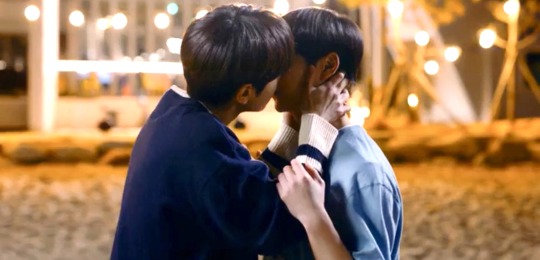
Light On Me - on the beach, the whole friendship group, the kiss that mirrors their couple habit of cheek squiging? Peak YA BL. It reminded me of Make it Right, and that's no bad thing... for me.
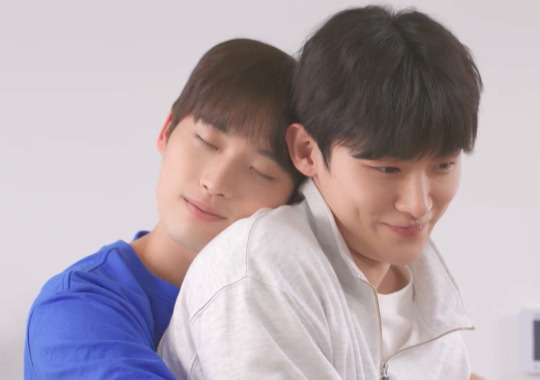
Our Dating Sim - domestic boyfriends and then the pan over to all their couple photos. So exactly them.
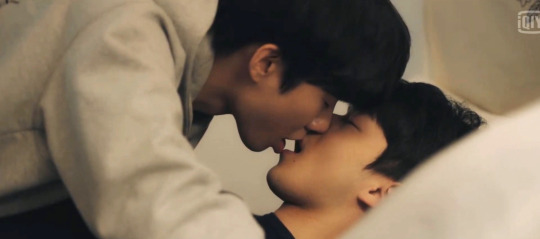
To My Star - yeah, the sex scene, but remember this was when we finally realized that JiWoo not only liked him all along but actually desired him all along. The tsundere character breaking open for us to see the soft underbelly. Suddenly, all of his behavior made sense in retrospect. They used the final ultra romantic sex scene as a CHARACTER REVEAL. Fucking genius.
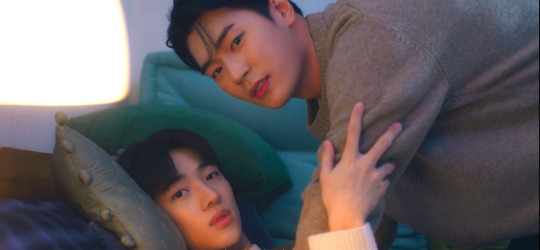
Semantic Error - the BOYFRIENDS of it all, the harken back to both the anime and the manga (with that spank bank file), the teasing and then the breaking of the forth wall. It was multiple cheeky punches out to the audience in a tiny stinger of a scene. Not to mention it had a kind of BL "ending fairy" thing that connected to them both being idols. Perfectly executed.
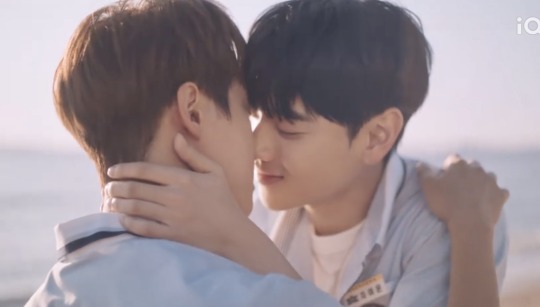
Love For Love's Sake - back in beach territory but wow. I mean this show starts with an ending. And it takes a lot for me to believe in the happiness of a parable about death and self worth. They managed it with this show. But that ending was killer.
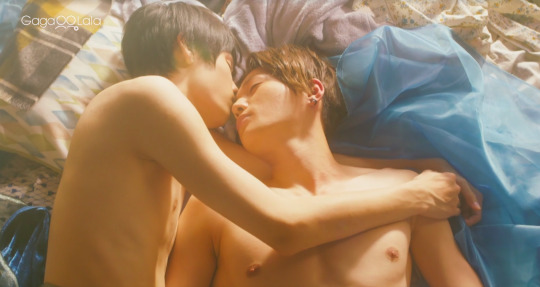
My Beautiful Man - the ending made me reassess everything about the show, the story, and the characters. The ending made me love the show. It changed my mind. It BLEW my mind. I might have kinda lost my mind. In real time.
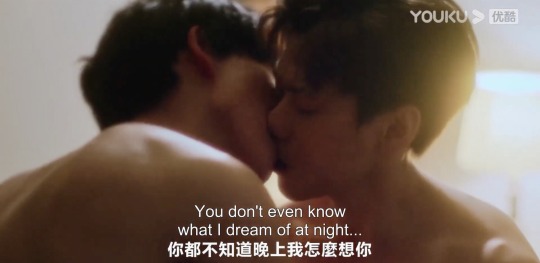
Unknown - there were struggles with this show and not everyone enjoyed the ending but I totally flipping loved it. FINALLY. You can't tell me that "you don't even know what I dream of" line doens't live in your head rent free.
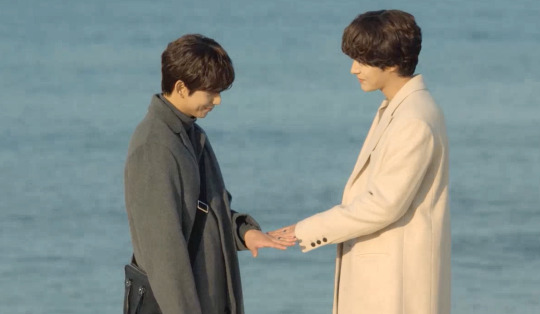
Unintentional Love Story - not the ending scene so much as the whole final episode, it's so good. It brings the story together, we get multiple big realizations, sad baby, learning that baby was abused too, defending baby, baby defending himself. RINGS!
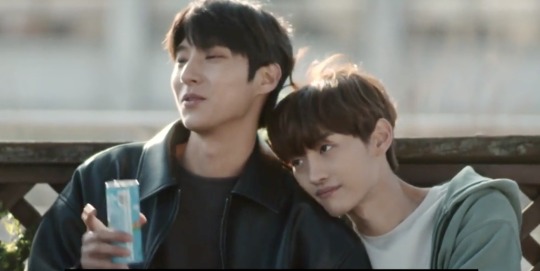
The Eighth Sense - so much peak boyfriend after so much angst. The casual language play and teasing, the stealing of the drink, just everything, and also how very very college it all is.
10 Others I just LOVE
Be Loved In House: I Do - ultra pasteurized cheese fest
Laws of Attraction - THE CAPED WEDDING OUTFITS
About Youth - rainbow kiss cheese fest
Long Time No See - BLOOD COVERED KISSES
Restart After Come Back Home - the pan around lens flare kiss and everything it MEANS
Bad Buddy - It was so CLEVER
DNA Says Love You - the claiming and then the tussle at the cafe? Gorgeous. Adorable. No notes.
Oh! Boarding House - a family gathering while the dads are holding hands behind the couch, adorable
Where Your Eyes Linger - that damn glow up
Tinted With You - perhaps... poly?
Wow... so few Thai BL. I guess this is Korea's strength in the BL sphere? Also more Japan than I expected and outsized rep for Taiwan. (I actually could have stuck a few more from Taiwan on here but they just get SO CHEESY.)
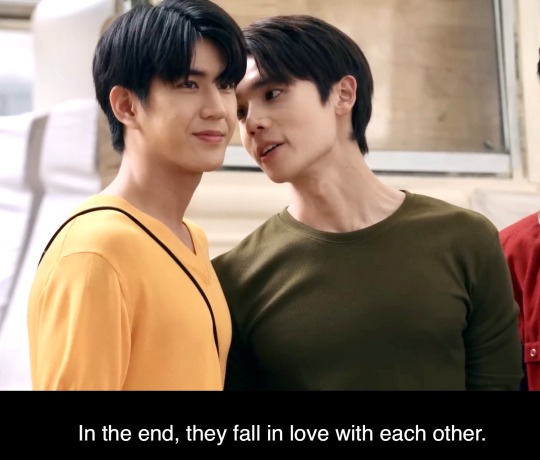
(source)
dated mid August 2024, not responsible for great endings after that date
#asked and answered#favorite strong endings in bl#bl with the best endings#how to stick the landing in BL#seven days#japanese bl#light on me#korean bl#our dating sim#to my star#semantic error#love of loves sake#my beautiful man#unknown#taiwanese bl#unintentional love story#the eighth sense
164 notes
·
View notes
Text
the girl next door 23
Warnings: this fic will include elements, some dark, such as age gap, manipulation, chronic illness, noncon/dubcon, coercion, and other untagged triggers. Please take this into account before proceeding. It is up to curate your online consumption safely.
Summary: A new neighbour moves in and upends your already disarrayed life.
Author’s Note: Please feel free to leave some feedback, reblog, and jump into my asks. I’m always happy to discuss with you and riff on idea. As always, you are cherished and adored! Stay safe, be kind, and treat yourself.
This lewk but silverfox
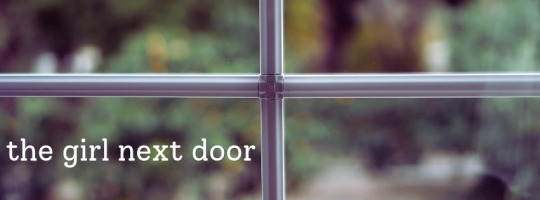
You can barely eat. You’re strung up in shock and shame, your stomach mulching as your nerves curdle. You only really have the toast, unable to stomach the omelet or hash that came with it. No one else seems discouraged by the day’s events.
As you wait for the cue to leave, Bucky signals to the server; a different one than before. They return with a container that Bucky offers to you. You take it, at first confused, then scrape your leftovers into it. You thank him as you close up the lid and rest it in your lap.
Finally, Steve pays the bill and you’re free to stand up. The jacket hangs heavily from your shoulders as you follow behind them through the restaurant. You watch your feet, too afraid to face the other diners. Are they judging you? Was it one of them who said something to the server?
You emerge into the sunlight and Steve’s voice buzzes in your ears. Most of the conversation at the table was nothing more than garbling to you. You just can’t make sense of any of this. You don’t know how but you know everything is going to change and that’s scary. You’ve only ever been with your mom. Now, he’s attached to her. Maybe, it means you’ll have to go.
“Over there...” Steve points, “nice spot.”
You follow the length of his arm to the little patch of grass on the other side of the lot. There’s a tree and a large stone surrounded by colourful petals. It’s a cute little space with a picnic table on the green blades.
“Just a few pictures,” Steve takes out his phone and hands it to Bucky, “this is a day we don’t wanna forget, huh, honey?”
Your mom grabs onto Steve’s hand and he almost winces. He squeezes and brings her with him across the lined tarmac. You shuffle behind them as Bucky holds the phone awkwardly. You cross the expanse of the lot and Steve brings your mother beside him to pose for a picture. You suppose they would need wedding photos even if it’s all a bit odd.
Bucky aims the lens and you hear the shuttering noise of the frames. Your mom is smiling again. It’s such a strange sight. You hug your leftovers and watch silently.
“How about we get both my girls in here?” Steve beckons to you, “a family picture.”
You blanch and furrow your brow. You look one way then the other and shrug. Bucky offers to take the leftovers, balancing it in one hand as he keeps the phone in his other. You reluctantly trod across the grass.
As you near, another waft of Steve’s cologne tickles your nose. You look down and slowly slip off his jacket and offer it up. He takes it and swiftly pulls it back on.
“Thanks, kiddo,” he says and pulls you against his side, your mother against his other, his arms spread wide around you both. “Say cheese.”
You face the camera and you know the first picture is bad. You must look startled. Your vision comes into focus and you see Bucky and the phone. You make yourself smile as Steve’s hand slides down your arm and instead grips your side, just where it’s smallest.
You stand for a few more as his fingertips curl into your flesh. Finally, he’s happy with it and Bucky drops his arm. Steve drags his hand away, brushing over your skirt in a way that makes you quiver. His touch leaves a hot tingling along your side.
You take your food back from Bucky and he hands the phone to Steve. He gives you a long look after.
“You wanna ride back with me?” He asks.
You nod. You just want to go home.
“Stevie,” your mom’s hand shakes as she latches onto Steve’s arm, “how about we... drive around for a while?”
“Uh, sure,” he answers, “sounds good. You okay with getting her home?”
“Yep,” Bucky frowns, as if annoyed at the redundant question. “I think I can handle it.”
“Don’t give him a hard time,” your mom snips at you. “Just go home.”
“Come on,” Bucky’s already turning away, “let the newlyweds enjoy their marital bliss.”
You nod and quickly spin to follow him. You almost admire his indifference to it all. The way he dismisses them both. It does make you wonder though, if he’s friends with Steve, why does he seem so agitated? Maybe he’s just as confused as you.
You go to his car and he opens the door for you. You thank him as you get in. It’s a nice gesture.
You stare through the windshield as he gets in. He’s quiet as the music comes back on. He leaves it and backs out of the spot. He drives by your mom and her husband. Your parents? Your eyes meet Steve’s as he stares, his hand running down his lapel. He doesn’t look as happy any more.
You shrink back into the seat, keeping the container just off your bare legs. When you get home, you’re throwing this dress out. You doubt you’ll ever have a reason to wear it again.
🏠
Bucky drops you off at the house. Walking up, knowing it's empty, you feel eerie. Everything is out of sorts. The world has tilted on its axis overnight.
You put your leftovers in the fridge and change, stuffing the dress into the bottom of the bin. You wander through the small house. You don't know what to do with yourself. Without your mom to tell you what to do, or what you're doing wrong, you're listless.
Finally, you sit down with your table and notebook, trying to center your energy on a page. As you touch the pencil to the paper, the tip snaps. You sigh and place the pencil down in the middle crease. You stretch your fingers and close them.
You just can't be still. You sharpen the pencil and tuck it into the book, hugging it under your arm. You put your shoes in and head off without destination. You just can't be in that house alone. Not right now.
You're uneasy at first as you stroll through the streets. You watch over your shoulder for the HOA as you go around corners. You come to the little bridge behind the house with the archway wrapped in ivy.
You stop at the peak of the bridge and bend back the cover of your sketchbook. You take the pencil and eye the small pond beneath. You mimic the ripples in graphite, etching on the moss and the leaves floating, and a few tadpoles beneath the surface. You don't often do still lifes, you never much leave your room, but it's calming to be out in the world and have a focal point.
A pebble drops into the water with a plop, sending an echo of circles through it. You step back, barely saving your book from slipping over the edge. You turn to face the figure at the end of the bridge. It's a boy. Well, he's probably your age so... a man?
He's strangely familiar. Reddish brown hair, warm dark eyes, and a crooked grin. You nearly gasp as he says your name like a question.
"How..." you close up your book and back up.
"Hey, I didn't know you were still around."
"Who?"
"Peter," he smiles, "how's your grandma?"
"My..." you shake your head. "She's dead."
"I mowed her lawn?" He offers as your confusion remains sewn into your forehead.
"Oh."
"You always had your colouring books."
"Yeah," you sniff. "Am I in your way?" You flatten yourself against the railing.
"Nope," he comes up the bridge, "so... you draw?"
"Uh, yeah," you glance towards the water.
"Nice, I'm more into photography," he raises hisbhand and shows a camera in his hand, "was coming to try to catch the frog that hangs out. You seen him?"
"Mm, no," you murmur, "I should go."
"I don't mind," he says, "if you stick around."
You hesitate, the bridge creaking under your feet. You think of the empty house, of the morning wedding and the restaurant. You're in no hurry to go back to any of it. You nod and turn around, "okay." You ppen your sketch book as he comes up beside you, a foot away as he fiddles with his camera.
"Living with my Aunt May now so... maybe we'll see each other around," he says as he switches the lens, "it won't feel so lonely around here.”
#steve rogers#dark steve rogers#dark!steve rogers#steve rogers x reader#the girl next door#au#silverfox au#series#drabble#mcu#marvel#captain america#bucky barnes
315 notes
·
View notes
Text
As we see an increase in antisemitism I have reflected on my experiences how many years ago being the token Jew in my eighth grade English class and I have found some aspects about it which lead me to believe are the parts that Holocaust Education in the U.S. goes wrong
Being taught in English Classes
Often such as in my state, the Holocaust is taught as part of English curriculum. English teachers aren't history teachers and they may be lacking in the skills or knowledge required to teach in the necessary depth to discuss the Holocaust.
My mother used to teach English but she had a history degree as well. She would lecture in class about everything leading up to and during WWII. I remember reading handouts she had in her classroom while I was waiting after school about the history of antisemitism. I didn't have any of this in my English class unit, because to put it simply most English teachers aren't my mother who also has the prior knowledge of how to teach history.
Additionally, as it is part of English, there is often more focus on Holocaust literature rather than the topic itself
This is where I think it gets extremely flawed if a person's primary knowledge of a historical period is Anne Frank or the incredibly inaccurate boy in the striped pajamas. A single account or work of complete fiction shouldn't be your main lens to view any topic whether it's the Holocaust, Slavery, Civil Rights movement etc.
You're in short blurring fact and fiction when discussing these things in the context of literature.
Sense of Finality
I feel like in my classes at least there was this idea that was kind of implied that hatred of Jews began and ended with Hitler and the Holocaust. I think this leads to misconceptions about antisemitism.
I feel this is a problem as I remember mistakenly getting that takeaway in school regarding civil rights in America. It was taught that Slavery was a problem, emancipation proclamation, MLK said I have a dream, and the civil rights act was passed and bam no inequality or racism. Later on, I fortunately learned this was flawed for many reasons. But not everyone does.
Not teaching about how the Holocaust happened
If you aren't given the knowledge of how centuries of hatred lead up to the Holocaust, I feel the main takeaway becomes that it was almost a random occurrence.
Many learn the Holocaust is bad without learning the signs of thinking that can lead neighbors to kill neighbors.
So many people don't have the basic facts such as Hitler being elected rather than assuming power.
I think when you learn of an atrocity of such scale without learning the human beliefs that brought about it, you have learned nothing.
I had a girl in my college uni class who was shocked when I said that antisemitism didn't begin and end with Hitler. I can see where she would get this idea if I at ten figured that racism ended with MLK.
Using Simulation
Slavery and the Holocaust should probably not be taught using roleplay. It usually goes poorly and you can find dozens of examples of how this goes wrong.
Sanitizing History
Exactly what it sounds like. But it's a major problem in general with history education in the US. I think we downplay westward expansion, and slavery in the us. When we downplay those it's easy to see how some begin to downplay the Holocaust.
We had a kid faint on the trip to the Holocaust memorial at some of the images. I think it was because they were inadequately prepared to see the horrors in image, my teacher didn't show any pictures in class.
Final notes
I don't blame teachers. Teacher's jobs fucking suck from what I've seen and many don't have the skills or resources or experience. I guess for now I think it's good to recognize those holes in our education and fill them ourselves through self education and life long learning
With the current political atmosphere of education of the unpleasant or difficult to discuss parts of history, i can only see things getting worse if we don't change anything. But like I said in the absence of a solid education which discusses these topics, it's important to educate ourselves and confront our lack of knowledge.
#tw shoah#tw holocaust#jumblr#feel free to add on with your school experiences#especially if you're jewish
167 notes
·
View notes
Text
“There are only so many books on Ukraine we can review each month,” an editor from a major British newspaper tells me at one of the country’s largest literary festivals. He looks a bit uncomfortable, almost apologetic. He wants me to understand that if it were up to him, he’d review a book on Ukraine every day, but that’s just not how the industry works.
Since the start of Russia’s full-scale invasion, I’ve had a glimpse into how several industries work: Publishing, journalism, and the broader world of culture, including galleries and museums. Even before the big war, I knew more than I wanted to about how academia works (or rather doesn’t) when it comes to Ukraine. A common thread among all these fields is the limited attention they allocate to countries that do not occupy a place among the traditional big players of imperial politics.
Cultural imperialism lives on, even if its carriers often proclaim anti-colonial slogans. It thrives in gate-keeping, with editors and academics mistrusting voices that don’t sound like those higher up the ladder, while platforming those who have habitually been accepted as authoritative. “We’ve done Ukraine already” is a frequent response whenever you pitch an idea, text, or public event centering the country.
The editor who can’t keep publishing reviews of Ukraine-related books walks away, and I pick up a copy of one of the UK’s most prominent literary magazines to see their book recommendations. Out of a handful of reviews, three are on recent books about Russia. It seems like the space afforded to Russia remains unlimited. I close the publication to keep my blood pressure down.
Keeping my blood pressure down, however, is challenging. When my social media feeds aren’t advertising another production of Uncle Vanya, they’re urging me to splash out on opera tickets for Eugene Onegin. What happened to the dreaded “cancelling” of Russian culture? The Russia section in most bookshops I visit in the UK is growing daily with everything from yet another translation of Dostoevsky to accounts of opposition figures killed or imprisoned by the Kremlin.
The international media focus on the August 2024 release of Russian political prisoners was yet another example of how the more things change, the more they stay the same. While these released prisoners were provided with a global media platform to call for an end to “unfair” sanctions on “ordinary Russians,” there was no mention of the thousands of Ukrainian civilians who continue to languish in Russian jails.
The ongoing international emphasis on all things Russian goes hand in hand with a reluctance to transform growing interest in Ukraine into meaningful structural changes in how the country is perceived, reported on, and understood. Although there has been some improvement in knowledge about Ukraine since 2022, the move is essentially from having no understanding to having a superficial grasp.
Each time I read a piece on Ukraine by someone not well-versed in the country’s history and politics, my heart sinks. The chances are it will recycle historical cliches, repeat Kremlin propaganda about Russophone Ukrainians, or generalize about regional differences. And to add insult to injury, such articles also often misspell at least one family or place name, using outdated Russian transliterations. A quick Google search or a message to an actual Ukrainian could prevent these errors and save the author from looking foolish. Yet aiding this kind of colonial complacency seems to bother neither the authors nor the editors involved.
I often wonder what would happen if I wrote a piece on British or US politics and misspelt the names of historical figures, towns, and cities. How likely would I be to get it published? And yet the same standards do not apply when it comes to writing about countries that have not been granted priority status in our mental hierarchies of the world. We can misspell them all we like; no one will notice anyway. Apart from the people from those countries, of course. And when an exasperated Ukrainian writes to complain, I can almost see the editors rolling their eyes and thinking, “What does this perpetually frustrated nation want now? We’ve done Ukraine. Why are they never satisfied?”
It is not enough to simply “do Ukraine” by reviewing one book on the war, especially if it’s by a Western journalist rather than a Ukraine-based author. It’s not enough to host one exhibition, particularly if it is by an artist or photographer who only spent a few weeks in the country. Quickly putting together a panel on Russia’s war in response to a major development at the front and adding a sole Ukrainian voice at the last minute doesn’t cut it either. This box-ticking approach is unhelpful and insulting.
It is important to acknowledge that some Western media outlets have significantly enhanced their coverage of Ukraine over the past two and a half years. They have typically done so by dedicating time and resources to having in-house experts who have either reported from Ukraine for many years, or who are committed to deepening their knowledge enough to produce high-quality analysis. However, many of these outlets still seem compelled to provide platforms for individuals entirely unqualified to analyse the region. Surely this isn’t what balance means?
Since February 2022, more than 100 Ukrainian cultural figures have been killed in the war. According to the Ukrainian Ministry of Culture, by May 2024, over 2,000 cultural institutions had been damaged or destroyed. This includes 711 libraries, 116 museums and galleries, and 37 theatres, cinemas, and concert halls. In May 2024, Russia bombed Factor Druk, the country’s biggest printing house.
When I attended this year’s Kyiv Book Arsenal, Ukraine’s largest literary festival, each panel began with a minute of silence to honor the memory of colleagues killed in the war. All this is in addition to mounting military losses, many of whom are yesterday’s civilians, including journalists and creatives who have either volunteered or been drafted into the army. This is the current state of the Ukrainian creative industry.
To save time for Western editors, publishers, and curators, let me clarify what all of us perpetually frustrated Ukrainians want. We would appreciate it if they turned to actual Ukraine specialists when working on Ukraine-related themes. Not those who suddenly pivoted from specializing in Russia, or who feel entitled to speak authoritatively because they discovered a distant Ukrainian ancestor, or those who have only recently shown interest in Ukraine due to business opportunities in the country’s reconstruction. We would be grateful if they took the time to seek out experts who have been studying Ukraine long before it became fashionable, who understand the country in all its complexity, and who care enough to offer Ukrainians the basic dignity of having their names spelt correctly.
I like to fantasise about a time when editors of top Western periodicals will choose to review books on Ukraine not simply because the country is at war and they feel obliged to cover it now and again, but because these books offer vital insights into democracy, the fight for freedom, or the importance of maintaining unity and a sense of humor in times of crisis. I hope for a day when galleries will host exhibitions of Ukrainian art, not just because it was rescued from a war zone, but because the artists involved provide fresh perspectives on the world.
I also dream that we, the perpetually frustrated Ukraine specialists, will eventually be able to focus on our own scholarship and creativity rather than correcting the mistakes and misleading takes of others. This will happen when cultural institutions, publishing houses, universities, and newspapers acquire in-house experts whose knowledge of Ukraine and the wider region extends beyond Russia.
Dr Olesya Khromeychuk is a historian and writer. She is the author of The Death of a Soldier Told by His Sister (2022). Khromeychuk has written for The New York Times, The New York Review of Books, The Guardian, Der Spiegel, Prospect, and The New Statesman, and has delivered a TED talk on What the World Can Learn From Ukraine’s Fight for Democracy. She has taught the history of East-Central Europe at several British universities and is currently the Director of the Ukrainian Institute London.
114 notes
·
View notes
Text
for all its (apparently many?) flaws, i really enjoyed the fallout show, and i'm ride or die for maximus, obviously. but one of the things i enjoyed about lucy's arc isn't that she wasn't necessarily proved RIGHT or WRONG about her own moral code, she didn't learn that either kindness is its own reward or that niceness is suicidal in a fight for survival.
what she learned, i am pretty sure, is that context matters. you can't actually help people if you don't know anything about them. you can't enact justice if you don't know what the case on trial is. you can't come in out of nowhere and make snap decisions and be anything more than one more complication in a situation that was fucked up long before you were born.
that's what we see over and over: she comes in out of nowhere, she makes an attempt to help based on her immediate assumption of what's going on, and then everything continues to be dangerous and complicated and fucked up. she doesn't let the stoners explain that some ghouls will genuinely try to eat you the minute they get the chance, and she pays for it. she jumps to the wrong conclusion in vault 4 because not everyone who looks like a monster IS a monster, and she pays for it. yeah a lot of the time cooper is abusing her for his own satisfaction, but when she's a free agent she's a loose canon and it's not because the show is punishing her for TRYING to do the right thing. it's because the show is punishing her for jumping to conclusions.
this show gets a lot of laughs from Fish Out Of Water situations, but i think that even though cooper explicitly says "you'll change up here and not for the better, you'll become corrupted and selfish just to survive" that's not the real message. what lucy learns is how important it is to hear people out, meet them where they're at, and get the full story.
that's why the final confrontation with her father is so important. she hears everyone out. she gets the full story. she listens to all of it. and then she acts with full knowledge of situation. that's what the wasteland taught her: not to be cruel, not to be selfish, but that taking the time to understand what's actually going on really matters.
this is a show that's incredibly concerned with truth and lies. everyone is lying to each other and themselves. scenes change over and over as they're recontextualized. love and hate and grief and hope are just motives in a million interconnected shell games, not redeeming justifications. maximus's many compounded falsehoods are approved of by his own superior, who finds a corrupt pawn more useful than an honorable one. cooper finds out his wife has her own private agenda and this betrayal keeps him going for centuries. lucy's entire society is artificial and from the moment they find out they're not safe and maybe never have been, all the vault dwellers are scrambling to deal with that.
ANYWAY. i just think it's neat. sci fi is a lens to analyze our present through a hypothetical future, and i think it's pretty significant for this current age we live in, where we're all grappling with misinformation, conspiracy theories, propaganda, and deepfakes, there's a huge anxiety over how hard it can be to find the truth out about anything. i think the show suggests that it's always worth the work to try.
#fallout#ive seen critiques that it's fascist and reactionary and i can't speak to that#since i don't play the games#but for what i saw i liked it and thought it made some good points#spoilers
183 notes
·
View notes
Text
A Grand(ish) Theory of What the Heck
I love the utterly unhinged, super detailed theories about what's going on in Good Omens, especially in season 2. I hope one or more of them turn out to be true, as some kind of glorious puzzle-box-hidden-code monstrosity. And also I think that there has to be a simpler explanation for things, for the people who are at least Somewhat Normal (tm) about this show. (... I assume such people do exist somewhere...) This is what I have been pondering recently.
The thing that started me thinking about this was this post, containing some promotional materials for season 2 that feature main characters with scenes in their heads. Like this:

Seeing this created a very similar situation in my own head, but with a nice shiny lightbulb.
All the weirdness: the car, the sideburns, the clock, the behavior of the folks of Soho, the vanishing storefront signs. The absence of God. I think this is all because everything we see is in their heads.
I don't mean it's made up. At least not entirely. Memory is already a plot point. Why not explore it on a deeper level? I've read theories emphasizing the minisodes' stories being retold by Aziraphale and Crowley. I think the whole season is like that.
You know that sort of conventional-wisdom-fact-concept that you can only dream faces of people you've seen before (or variations therein), because your brain can't make new faces up? So it just fills in what it thinks is close enough? I think that idea, applied to remembering or recollecting things, could explain so many things that are wonky in this show.
Wonky Things
Crowley parking in an impossible London location? He definitely remembers it was in London, so his brain just stuck some obvious London landmarks in there.
Awkward clattering happening when Crowley throws the stacks of books he's inexplicably carrying around the bookshop? He wouldn't actually throw Aziraphale's books! But he'd like to think he's cool and nonchalant enough to do that, and if he did it would definitely make Some Kind of Noise.
Jim walking toward the bookshop from somewhere mysterious? Maggie and Nina saw him first, and he came from that direction, so he must've walked all that way. They don't know about the elevator in the Donkey.
Aziraphale remembers tartan hills and the Loch Ness monster because he was having a jolly time driving through Scotland, so obviously the scenery must've been whimsical Scottish things.
Nina put the Honolulu roast sign up, so she remembers its presence, but perhaps the occult/ethereal visitors to her shop do not.
Maggie really did text Aziraphale about the rent, but a note through the mail slot is a much more dignified way for a scholarly angel to imagine he received a message.
On the Fallibility of Recall
This season is loaded with unrealistic inclusions. The colors are turned up to 11. Some of the scenes are more caricature than believable interaction. Remembering things never copies or reproduces them with what one might call high fidelity.
Scenes recalled by separate memories will inherently vary. One person's hefty jigger might be another person's dash. Who knows for sure where the sun was that day? You and I might recall an event having different lighting or a different color palette, sort of like viewing something with different lens filters.
According to Neil, Crowley is an unreliable narrator of the story of his Fall. He labels the variations in clock times as a continuity error in a show where Everything Is Meant, but he doesn't say whose continuity error it is. He insists that the Bentley is the same through the whole season; maybe it was the same, but remembered differently. Maybe this is part of why there's more CGI but it's harder to spot.
So What?
Is this all there is to it? I sure hope not. I like my Good Omens with enough layers to put to shame an onion wrapped in a cake and covered in a parfait.
Is this possibly the fancy footwork that's distracting from the real magic trick? I wouldn't put it past Our Gaiman. There are a lot of things one could hide in the narrative of unreliable memory.
Is this going to stop me from rewatching and repondering and remaking theories for the next couple years? Not even at gunpoint.
188 notes
·
View notes